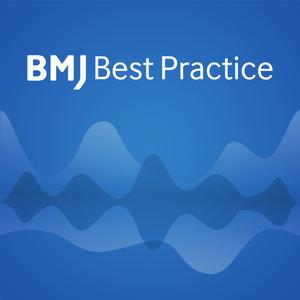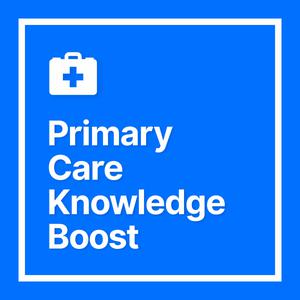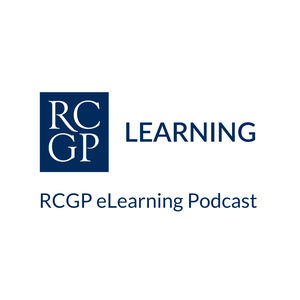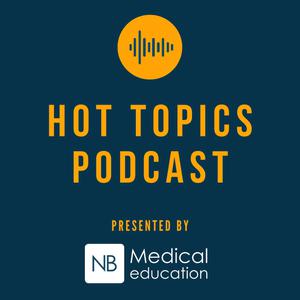
GPnotebook Podcast
GPnotebook
GPnotebook Podcast
- 12 minutes 58 secondsEp 103 – Primary prevention of cardiovascular disease: what has changed in QRISK3 and why?
In this episode, which has been recorded for Chronic Conditions Month 2024, Dr Yassir Javaid (GP with a Specialist Interest in Cardiology) examines the role of the QRISK3 calculator in the primary prevention of cardiovascular disease. He considers the development of the tool, the differences between QRISK2 and QRISK3 (including the additional risk factors now included in the updated calculator) and the strengths and limitations of QRISK3 in understanding a person’s cardiovascular risk.
More information on Chronic Conditions month can be found here.
Access episode show notes containing key references and take-home points at: https://gpnotebook.com/en-GB/podcasts/cardiovascular-medicine/ep-103-primary-prevention-of-cardiovascular-disease-what-has-changed-in-qrisk3-and-why.
Did you know? With GPnotebook Pro, you can earn CPD credits by tracking the podcast episodes you listen to. Learn more.
2 May 2024, 11:34 am - 17 minutes 46 secondsEp 102 – Diverticular disease
Diverticular disease is a condition characterised by the presence of small pouches, called diverticula, in the wall of the colon (large intestine). These pouches can develop when weak spots in the colon's muscular wall give way under pressure. Diverticular disease encompasses two main conditions: diverticulosis and diverticulitis. In this episode, Dr Roger Henderson takes an overview look at the symptoms and management of these as well as their prognosis and prevention.
Access episode show notes containing key references and take-home points at: https://gpnotebook.com/en-GB/podcasts/gastroenterology/ep-102-diverticular-disease.
Did you know? With GPnotebook Pro, you can earn CPD credits by tracking the podcast episodes you listen to. Learn more.
25 April 2024, 9:02 am - 15 minutes 43 secondsEp 101 – Coeliac disease
Coeliac disease (CD) is a chronic autoimmune disorder that primarily affects the small intestine and is triggered by the consumption of gluten, a protein found in wheat, barley, rye and sometimes oats. When individuals with CD ingest gluten, their immune system responds by damaging the lining of the small intestine. This damage impairs the absorption of nutrients from food, leading to various symptoms and potentially serious complications. In this episode, Dr Roger Henderson looks at the diagnosis, testing and management of CD, along with the importance of longer-term follow-up in people with it.
Access episode show notes containing key references and take-home points at: https://gpnotebook.com/en-GB/podcasts/gastroenterology/ep-101-coeliac-disease.
Did you know? With GPnotebook Pro, you can earn CPD credits by tracking the podcast episodes you listen to. Learn more.
19 April 2024, 9:55 am - 11 minutes 23 secondsEp 100 – Alcohol and health: a review of the latest research
In this episode, Dr Hannah Rosa takes a look around the world at some of the different strategies that are being used to try to reduce the health complications caused by alcohol. She then looks at the latest research which links alcohol as a primary cause of a variety of cancers, before finishing with a consideration of the economic cost.
Access episode show notes containing key references and take-home points at: https://gpnotebook.com/en-GB/podcasts/general-practice/ep-100-a-review-of-the-latest-research-on-alcohol.
Did you know? With GPnotebook Pro, you can earn CPD credits by tracking the podcast episodes you listen to. Learn more.
11 April 2024, 10:28 am - 22 minutes 36 secondsEp 99 – Assessment and management of obesity
Obesity is a medical condition characterised by excessive accumulation of body fat, to the point where it may have adverse effects on health. Its incidence is steadily rising in both young people and adults. It is typically measured using BMI, but this has limitations and may not always accurately represent the level of obesity. While genetics and hormonal factors have a role in obesity, lifestyle choices (such as diet and physical activity level) and environmental factors also significantly contribute to its development. In recent years, the prevalence of obesity has been on the rise globally, leading to serious health concerns such as increased risks of heart disease, type 2 diabetes, certain types of cancer and other health problems. In this episode, Dr Roger Henderson provides an overview of the rise of obesity, the management options we have in general practice and the impact of newer injectable drugs for weight loss that many patients are now requesting.
Access episode show notes containing key references and take-home points at: https://gpnotebook.com/en-GB/podcasts/obesity/ep-99-assessment-and-management-of-obesity.
Did you know? With GPnotebook Pro, you can earn CPD credits by tracking the podcast episodes you listen to. Learn more.
4 April 2024, 1:49 pm - 16 minutes 9 secondsEp 98 – Recurrent vulvovaginal candidiasis
Recurrent vulvovaginal candidiasis is reported in 6% of women of reproductive age. It has a significant impact on an individual’s quality of life that is comparable to conditions such as asthma and migraine. Appropriate management of the acute infection and subsequent maintenance treatment can help to reduce the burden of this condition. In this episode, Dr Kate Chesterman discusses the risk factors for recurrence and considers appropriate investigations. She looks at options for management, including lifestyle changes and induction and maintenance regimens.
Access episode show notes containing key references and take-home points at: https://gpnotebook.com/en-GB/podcasts/gynaecology/ep-98-recurrent-vulvovaginal-candidiasis.
Did you know? With GPnotebook Pro, you can earn CPD credits by tracking the podcast episodes you listen to. Learn more.
28 March 2024, 10:07 am - 17 minutes 16 secondsEp 97 – Peptic ulcer disease
The most common cause of peptic ulcers (gastric and duodenal) is infection with Helicobacter pylori (H. pylori) or the long-term use of nonsteroidal anti-inflammatory drugs (NSAIDs). Other factors such as excessive alcohol consumption, smoking, stress and certain medical conditions may also contribute to the development of peptic ulcers. Symptoms of peptic ulcer disease can vary but may include burning stomach pain, nausea and vomiting, bloating or belching and loss of appetite. Treatment typically involves a combination of lifestyle changes and medication to reduce stomach acid production, eradicate H. pylori infection (if present) and protect the lining of the stomach and small intestine. In this episode, Dr Roger Henderson provides a thorough overview of peptic ulcer disease and talks about the latest advice on diagnosis, investigations and treatment.
Access episode show notes containing key references and take-home points at: https://gpnotebook.com/en-GB/podcasts/gastroenterology/ep-97-peptic-ulcer-disease.
Did you know? With GPnotebook Pro, you can earn CPD credits by tracking the podcast episodes you listen to. Learn more.
21 March 2024, 10:45 am - 12 minutes 43 secondsEp 96 – Dysphagia
Dysphagia refers to difficulty swallowing. It can occur at any age and may be caused by various conditions, including neurological disorders, muscular disorders, structural abnormalities, or even psychological factors. Dysphagia can range from mild to severe, and it can lead to complications such as malnutrition, dehydration and aspiration pneumonia if not properly managed. The treatment for dysphagia depends on the underlying cause and may include dietary modifications, swallowing therapy, medication or surgery. In this episode, Dr Roger Henderson takes an overview look at the causes, assessment, investigations and treatments of dysphagia, along with a reminder of oesophageal cancer, its treatment and prognosis.
Access episode show notes containing key references and take-home points at: https://gpnotebook.com/en-GB/podcasts/ear-nose-and-throat/ep-96-dysphagia.
Did you know? With GPnotebook Pro, you can earn CPD credits by tracking the podcast episodes you listen to. Learn more.
14 March 2024, 10:54 am - 12 minutes 40 secondsEp 95 – Trigeminal neuralgia
Trigeminal neuralgia (TN) is a condition characterised by severe, shooting pain in the face, along the trigeminal nerve. The pain can be triggered by even mild stimulation of the face, such as brushing teeth, touching the face or eating. It is often described as one of the most excruciating pains known to medicine and it can significantly impact a person's quality of life. The exact cause of trigeminal neuralgia is often unknown and treatment options include carbamazepine or gabapentin, as well as surgical procedures that relieve pressure on the trigeminal nerve or disrupt the pain signals in some cases. In this episode, Dr Roger Henderson looks at what GPs need to know when patients present in surgery with trigeminal neuralgia, when to refer them to secondary care and the prognosis for these patients.
Access episode show notes containing key references and take-home points at: https://gpnotebook.com/en-GB/podcasts/neurology/ep-95-trigeminal-neuralgia.
Did you know? With GPnotebook Pro, you can earn CPD credits by tracking the podcast episodes you listen to. Learn more.
7 March 2024, 10:32 am - 12 minutes 44 secondsEp 94 – Anal fissures
Anal fissures are small tears or cracks in the lining of the anus which can cause pain, bleeding and discomfort, particularly during bowel movements. They are quite common and can be caused by various factors such as constipation, diarrhoea, childbirth or anal trauma. Treatment often involves keeping the stool soft and avoiding straining during bowel movements. This may include dietary changes, fibre supplements, topical medications, or in some cases, surgery. In this episode – which has been suggested as a topic by one of our listeners – Dr Roger Henderson looks at these in more detail as well as when to refer, and the options available for treatment in secondary care.
Access episode show notes containing key references and take-home points at: https://gpnotebook.com/en-GB/podcasts/gastroenterology/ep-94-anal-fissures.
Did you know? With GPnotebook Pro, you can earn CPD credits by tracking the podcast episodes you listen to. Learn more.
29 February 2024, 10:15 am - 13 minutes 7 secondsEp 93 – Haemorrhoids
Haemorrhoids are a very common finding in the Western world and are often seen in our surgeries. They are frequently under-reported so their exact incidence can be difficult to quantify; however, estimates are that 50% of the population experience them by the age of 50. Because many people attribute symptoms of more serious pathology to haemorrhoids, careful evaluation is always very important. Fortunately, most cases are simple to treat and often resolve very quickly, although up to 10% of sufferers may require surgery to fully alleviate their symptoms. In this episode, Dr Roger Henderson looks at the classification of haemorrhoids, their predisposing factors, symptoms — including red flag symptoms — and treatments.
Access episode show notes containing key references and take-home points at: https://gpnotebook.com/en-GB/podcasts/general-information/ep-93-haemorrhoids.
Did you know? With GPnotebook Pro, you can earn CPD credits by tracking the podcast episodes you listen to. Learn more.
22 February 2024, 11:02 am - More Episodes? Get the App
Your feedback is valuable to us. Should you encounter any bugs, glitches, lack of functionality or other problems, please email us on [email protected] or join Moon.FM Telegram Group where you can talk directly to the dev team who are happy to answer any queries.
 BMJ Best Practice Podcast
BMJ Best Practice Podcast
 Primary Care Knowledge Boost
Primary Care Knowledge Boost
 You Are Not A Frog
You Are Not A Frog
 RCGP eLearning Podcast
RCGP eLearning Podcast
 NB Hot Topics Podcast
NB Hot Topics Podcast
 Medics Money podcast
Medics Money podcast